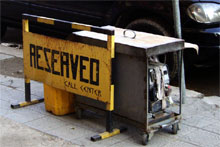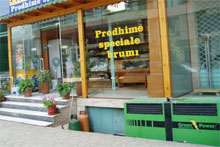“We bought the generator before we even opened the store,” says Luljeta, who moved to the Albanian capital from Athens with her husband and daughter three years ago. Many Albanians rely on generators for power
Many Albanians rely on generators for power
Power outages—load shedding in the bland technical parlance of bureaucrats—are as old as the teenagers here who don't remember Communism, as common as the grumbling about life, and as unpredictable as the politics that have shaken the country over the past decade.
Last year was hell. Blackouts stretched to more than 10 hours per day during winter. This year is now the upper rung in Purgatory. It's a persistent problem. The country averaged five hours per day of no electricity in the winter of 2002 – almost double the amount of 1999.
Albania has not worked out how to quench its growing thirst for electricity with an infrastructure that relies almost entirely on rivers fed by rain and melted snow. Communist-trained engineers and Western-educated managers and blackout victims alike agree that insufficient rainfall, an aged grid, the lack of amenable politics, blatant theft and a surge in energy consumption that started with cheap Turkish electric ovens and Bulgarian fan heaters in 1992 all conspired to crash the system at about the same time Communism was expiring.
Electricity consumption has nearly doubled since the early 1990s, and later in that decade, Albania became a net importer. The country needs about five to six Terawatt-hours annually. Three dams on the Drin, a picturesque but fickle river that flows from the steep northern mountain valleys into the Adriatic , can produce only between three and five Terawatt-hours.
Living the Good Life
Pirro Kaltani knows a thing or two about this. A stout mechanical engineer who now sells back-up power, Kaltani imported ovens from Istanbul when his factory shut down in the early 1990s. Buyers mobbed each truck as he brought in his loads. Farmers and country dwellers found that they could bake their own bread with the ovens and avoid the high prices of state bread stores.
Until then, the population had lived on rationed food, firewood, and lamp oil for cooking. Electricity would shine arc lamps, the odd television set and the even rarer refrigerator. Albanians sought new goods that changed their lives, but called for more and more electricity: microwave ovens, laundry machines, air conditioners, water boilers, water pumps.
Albania , long one of the lowest consumers of electricity per household in Europe , started to outpace its ability to power its new lifestyle.
Andi Beli, the 36-year-old general manager of the state energy company Korporata Elektroenergjetike Shqiptare (KESh), is supposed to solve Albania 's chronic electricity shortage. He is the eighth manager of the company in eight years, coming to KESh last fall from Milan where he worked in a business consulting company. The others fell victim to Albania 's toxic politics. He was an unusual choice for Albania . He speaks Norwegian. Friends call him a geek – one recalls going to the beach with Beli and listening to him give a solo recitation of the Latin names of all the plants in sight.
He's smart enough to know he cannot fix the country's energy problems alone. “There is a region-wide crisis,” he said.
Greece is short on electricity. Italy had to curb the electricity supply to industry last year. Only three countries in the Balkans have been net exporters: Romania , Bulgaria and Bosnia-Herzegovina. Even then, corruption, waste and a lack of investment in BiH threatens its status in this category, and when Bulgaria closes two suspect reactors at its nuclear power plant as planned in January, it will become a net importer.
“That will endanger all of us,” said Sadik Llapashtica of Wonder Power, one of the new energy traders in the country.
Prices are going up across the region. According to Beli , Macedonia and Kosovo bought electricity at 50 and 60 euros per MWh, about double the typical price. Meanwhile, Beli has continued the work of his predecessors in trying to put the former socialist-style behemoth in order. Long overstaffed, the company is down from 12,500 employees three years ago to 8,000. About 20 percent of businesses and househoulds use generators for back-up power
About 20 percent of businesses and househoulds use generators for back-up power
Three years ago, one-third of the population was stealing electricity either because they did not have meters or had bypassed them by wiring themselves directly into the grid. Currently 120,000 of 900,000 customers still are without meters and some 20 percent of the country's electricity disappears without being paid for.
A bigger problem is that KESh, like power companies through the region, is a tool politicians use to subsidize state companies and poor populations. Many state companies have not paid for electricity in years. Rather than close down the deadbeat companies and face social unrest, officials ignored the unpaid bills. The state still subsidizes electricity, charging 5.6 cents per KWh that cost about 8 cents to generate.
Still, Beli said that the costs of operations are now covered by energy bills and that the company is looking at investing in the network's infrastructure. The World Bank, the European Investment Bank and the EBRD, and the governments of Italy , Austria , Switzerland , Japan and Norway have pledged donations and favorable loans to help.
The government hopes to sell its distribution system as nearly all former Communist Europe have done in hopes of securing better management, although Beli says might take two years. The ownership of the power stations has yet to be decided.
The government stepped in and renegotiated KESh's debt to them from about $180 million to $20 million. KESh's turnover is now about half a billion dollars. But, for example, in Kukes, a mountainous district in northeastern Albania with its two main power stations, only about 10 percent of the population typically pays. They argue that since the power stations are on the region's territory, they have free claim to its electricity.
And while the country works on its internal system, its connections to the world are tenuous.
Albania has had only three high-voltage wires to the outside world since the 80s. Two go to Montenegro and Kosovo, but both are 220 kV – the equivalent of a pair of two-lane roads crowded with trucks. A 400 kV line goes to Greece but that line is less useful because Greece itself must buy a lot of electricity.
“When you face a bottleneck in Serbia or Macedonia somewhere, you get stuck,” said Beli. “Right now, our interconnection lines are just within the limit capacity.” With more and more energy traders wheeling electricity throughout the southeast European region, those lines are often busy, as in the fall of 2005 when Albania could not get electricity because the lines were used up.
However, others say there may be enough capacity. Peter Styles, a board member of the European Federation of Energy Traders says many of the countries in the region allow very little capacity for cross border energy swaps. The conservative transmission operators only allow 10 to 50 percent of the capacity to transfer energy exacerbating the congestion at interconnection points.
Other infrastructure problems loom. The system loses up to 20 percent of its electricity because of old equipment and inefficiency in the system. The old high voltage system went from 400 to 110 to 35 to 6 to 0.4 kv, when each change causes losses. Only now is that being standardized.
Domestic traffic had changed too. In the 1990s, thousands moved from impoverished areas into Tirana's suburbs. The grid could not support that shift, and transformers blew out. The same thing has happened in fast-growing tourist areas. Beli is smart enough not to make empty promises.
“How can I guarantee no blackouts?” he said. “No one could guarantee that.” Knowing that, Albanians like the Tanis continue to invest in their own little humming power companies. According to INSTAT, the national statistics office, 157,000 generators have been imported into Albania in the last six years – enough to cover almost 20 percent of the households and businesses.




